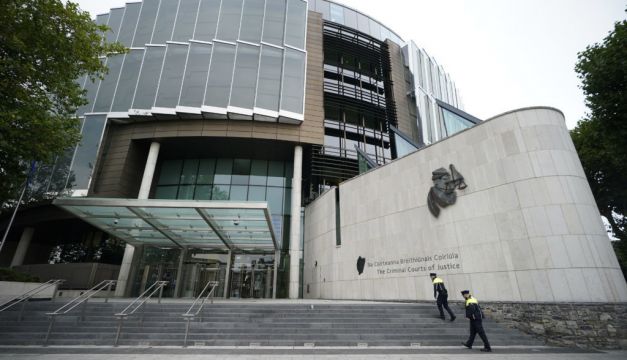A woman who was allegedly raped in a Dublin park almost five years ago has denied having any previous romantic involvement with the accused man.
A Dublin man (55), who cannot be named for legal reasons, has pleaded not guilty to rape in September 2019 in a park following a party at his house.
On the second day of the Central Criminal Court trial on Thursday, a friend of the complainant said the woman called to her house in a distressed state a few days after the alleged incident.
She took the complainant to her bedroom, where she fell to the ground crying and shaking, the court heard.
The witness said she asked her friend if something had happened to her at the party, but the complainant was too upset to answer.
The witness said she then asked her friend if the accused man had raped her. “She said 'don’t say that, don’t say that word'. She was hysterical.”
She said her friend told her she did not want the man to walk her home from the party, but he did. She said she was told by her friend that the man was “inside” her in the park.
She said she had never seen the complainant so upset, and tried to support and comfort her. The witness said her friend stayed at her house that night before returning home the following morning.
She told Sean Gillane SC, prosecuting, there was “no love or friendship” between the man and the complainant.
During cross-examination, she said she had never seen the complainant drunk.
Disagreement
Earlier, the complainant agreed with Dominic McGinn SC, defending, during cross-examination that she had not spoken to the accused for around five years prior to the alleged incident due to a disagreement.
She accepted it was “unusual” that the man came into the bathroom but said she did not tell anyone, referring to an incident before the alleged rape when the man walked in on her while she was in the bathroom of his home.
She said she thought his comment “I could have you now” referred to something violent, not sexual, but she repeated that she did not feel threatened.
Mr McGinn suggested his client was never in the bathroom with her. “I suggest you are wrong,” she replied.
She denied Mr McGinn's contention that she was “briefly romantically involved” with his client, and rejected a contention from the defence that she took a particular route home to spend more time with the accused man.
Mr McGinn put it to the woman that she fell onto the ground in the park, then performed oral sex on his client before inviting him to engage in sexual intercourse.
Defence counsel then suggested that she made a comment like “I have you now” or “I'll ruin your life” to his client.
“Absolutely not, no,” she replied.
I didn’t want him to be contaminated.
She accepted the defence's suggestion that she engaged with the accused by text the next day, but could not remember if they met up.
Mr McGinn suggested to the woman that she said the sex was non-consensual as an explanation for her partner, which she rejected.
During re-examination, she said she and her partner became upset on the Monday after the alleged incident because she did not want him to hug her.
“I didn’t want him to be contaminated. I wouldn’t let my children touch me [that weekend].”
In her direct evidence, the woman was taken through a series of Viber messages which she received from an unknown number over three years.
She said she had a few phones during this period and generally blocked the number. However, she said she often responded as she wanted to know who was sending the messages.
She said she became aware that the phone belonged to the accused man after making a statement to gardaí.
She agreed with defence counsel that she saved the number in her phone under the name 'dickhead', and often deleted messages received or replies sent.
She said she only engaged with the number to try to find out who the sender was, and denied knowing the phone belonged to the accused.
She rejected Mr McGinn's suggestion that his client messaged her during the party so they could communicate. She also denied the defence's contention that she wanted his client to walk her home “with a view to engaging in something sexual when you got to the park”.
During re-examination, she said she received “thousands” of messages from this number over three years. She said her partner, her friend and others were aware of the anonymous messages, about which she also contacted gardaí.
A friend of the woman confirmed she was aware her friend was receiving Viber messages from an unknown number.
If you have been affected by any of the issues raised in this article, you can call the national 24-hour Rape Crisis Helpline at 1800-77 8888, access text service and webchat options at drcc.ie/services/helpline/ or visit Rape Crisis Help.







